Author’s note: This series shares six stories about members of The Church of Jesus Christ of Latter-day Saints from the Democratic Republic of the Congo. Each story is framed in the context of a Christlike attribute. This article with examples of hope is an adapted and expanded from part of a presentation given at the FairMormon 2018 Conference. The video version of the entire FairMormon presentation is available on the FairMormon YouTube channel at https://www.youtube.com/watch?v=nJl9FvLKmjw
This story is one of joy, but even more so one of hope. Of course, as Brother James E. Faulconer reminds us, the kind of hope described in scripture is not a “natural hope” for “bodily and worldly matters — the hope that our job will be rewarding, that our children will do well in school, that we will get a raise. Christian hope is the hope for salvation.”[2] Moreover, Christian hope is a palpable divine gift, not simply a vague and wistful longing. Those who have proven faithful obtain an initial hope of attaining God’s kingdom when He grants them the “earnest of the Spirit in [their] hearts.”[3] Such hope provides an “anchor … sure and steadfast”[4] to those who suffer indignity and injustice in this life, allowing them to see God’s promises with absolute confidence from “afar off,” and to be “persuaded of them,” and to “[embrace] them,”[5] knowing that “God … hath prepared for them [the supreme inheritance of His celestial] city”[6] in His own due time.
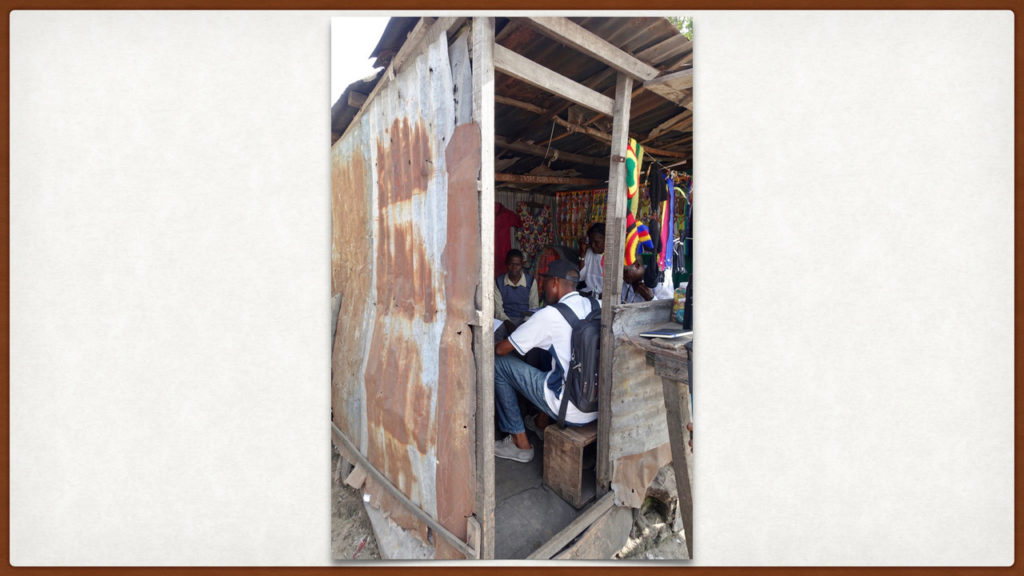
The outside of the shop we are visiting is nothing remarkable. A tiny building measuring perhaps two meters square, inconspicuous among a crowded row of small businesses along the side of a busy, noisy road of packed dirt. Inside the building, a family of five people — a mother, a father, and three children — live and work. There is no electricity and no plumbing.
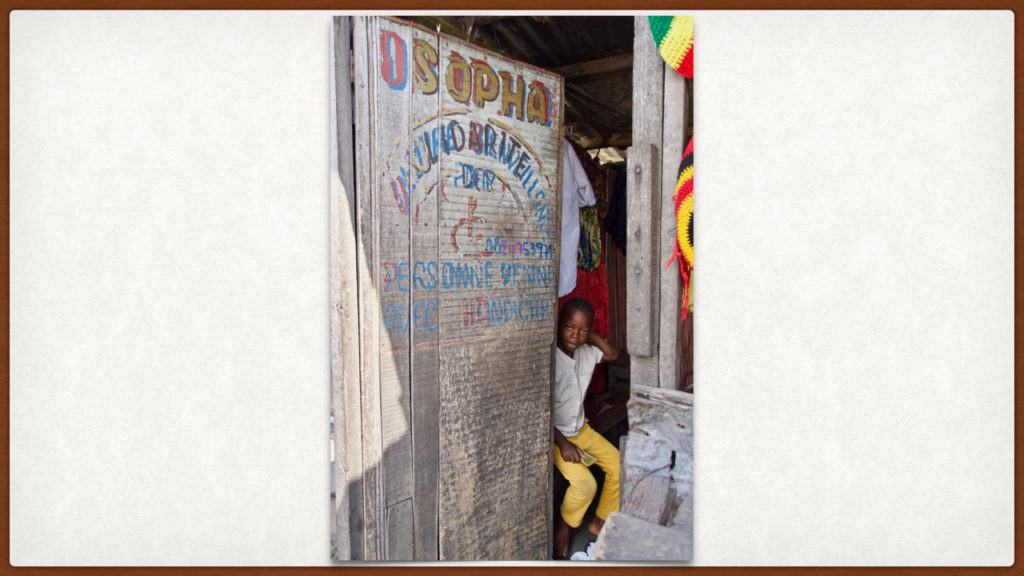
The sign on the wooden door bears a painting of a wheelchair, indicating that a disabled person is within.
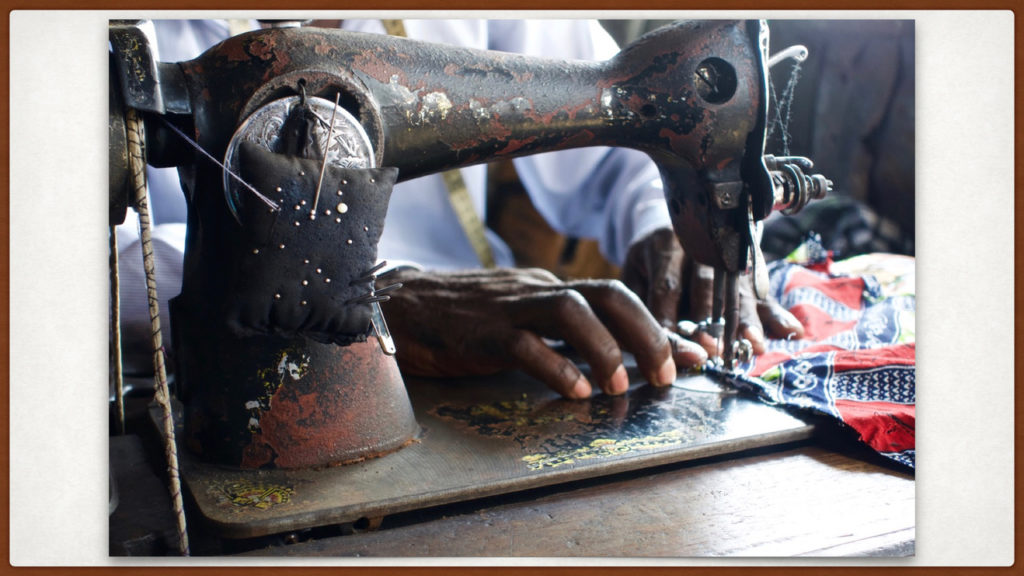
Inside a man works busily on a child’s garment using a pedal-operated sewing machine.
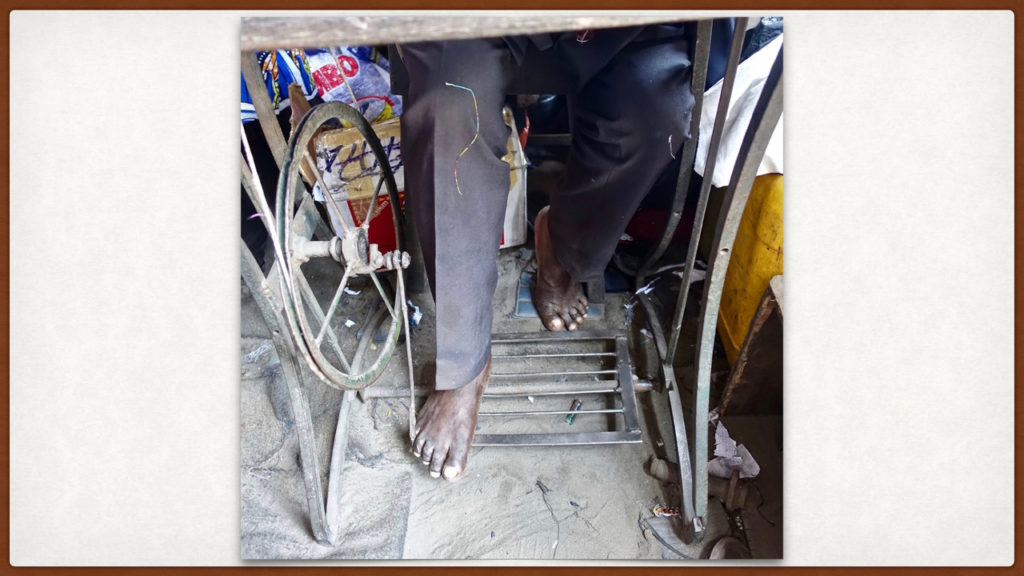
The manual pedals for the machine give him the complete control of the speed of the machine he needs.
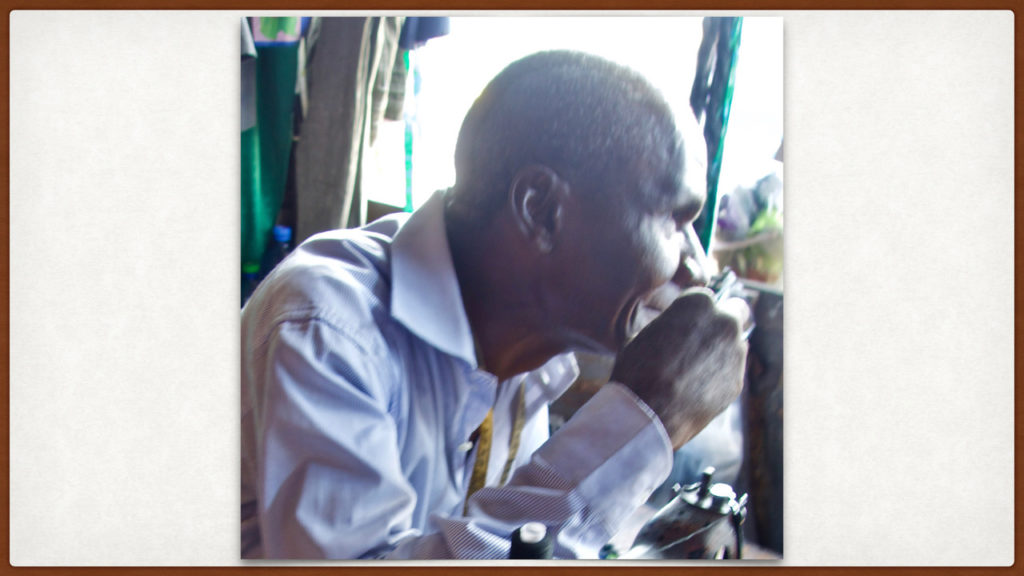
Luvualu Mwinza David deftly puts the thread through the needle and cuts it with his teeth. He is totally blind in both eyes. He lost his right eye at two years old when it came out of the socket after a bout with the measles. He lost his left eye at the age of twenty.
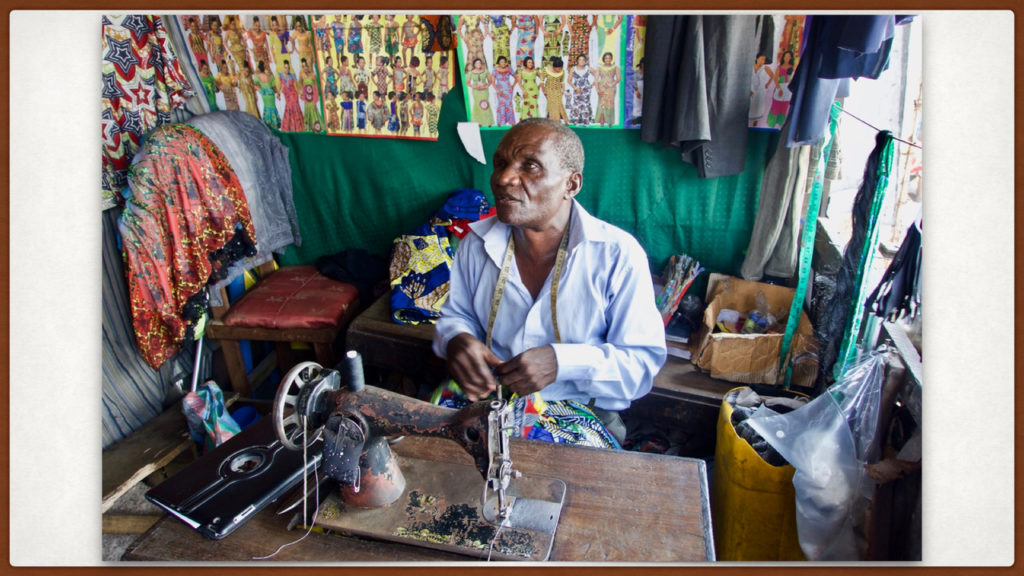
Customers select the style they want from the chart on the wall behind David’s machine. His wife, Ndotoni Josephine, herself suffering with a motor handicap, tells him the number corresponding to the style chosen. He takes it from there to create the garment.
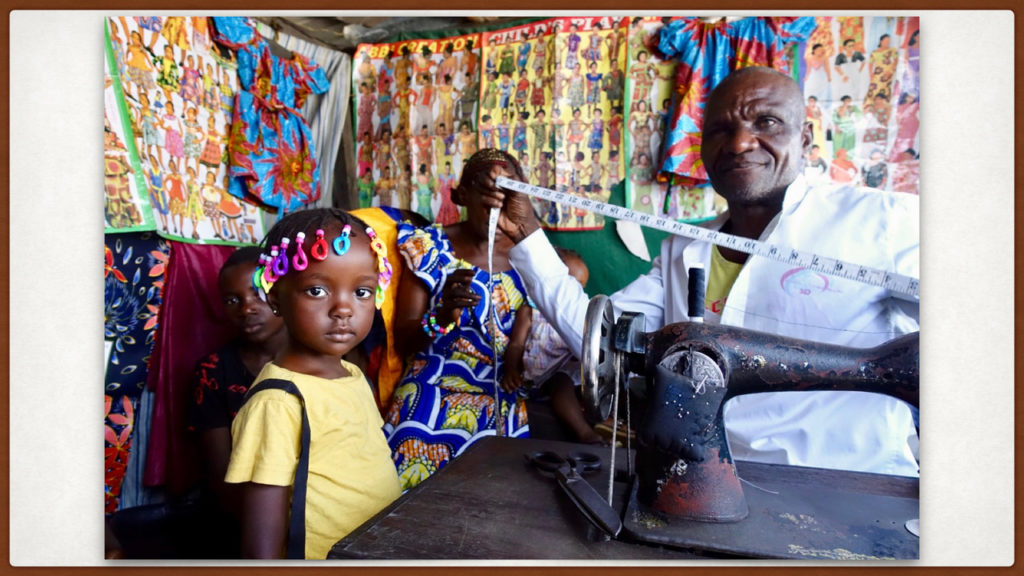
The most amazing part of the work was watching him measure the clothing, here shown measuring Nephi Kaluwa’s daughter Délice. Our friend Athanase Ngandu told us that he did not believe that David was really blind until he noticed his wife giving him small corrections with the measurements as necessary (e.g., 52 vs. 50 centimeters—an impressive accuracy of 96% in this case).
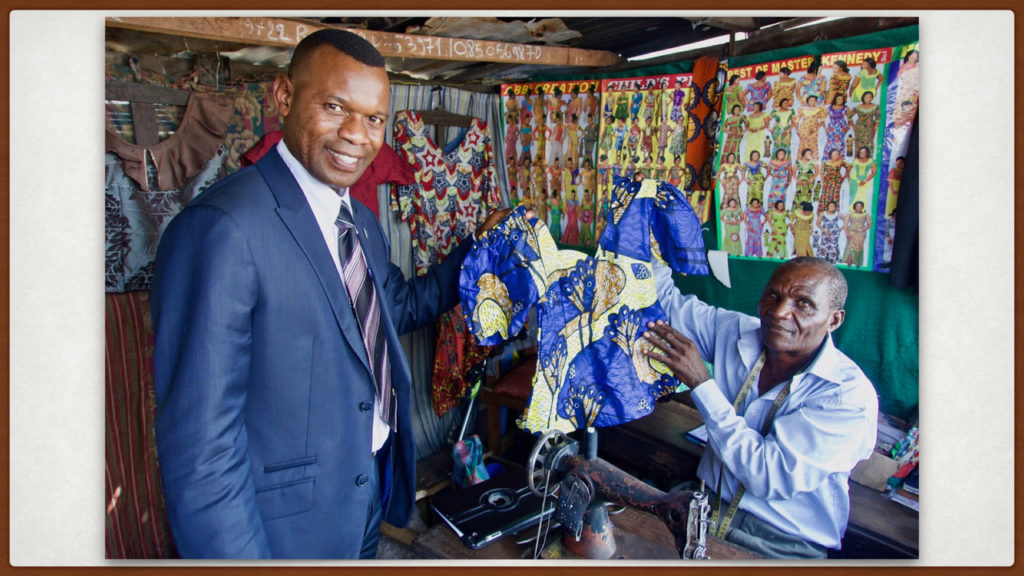
David is very talented. He holds up a child’s garment with President Ephraim Zola, at that time a counselor in our stake presidency. President Zola is wearing a suit that David made for him. David says: “There are those [who leave me with an order for clothing here] who don’t know that I’m blind. Once [they learn] that I’m blind and ask an opinion of my work, people tell them they will be very happy with what I am making for them. And I share in that joy."
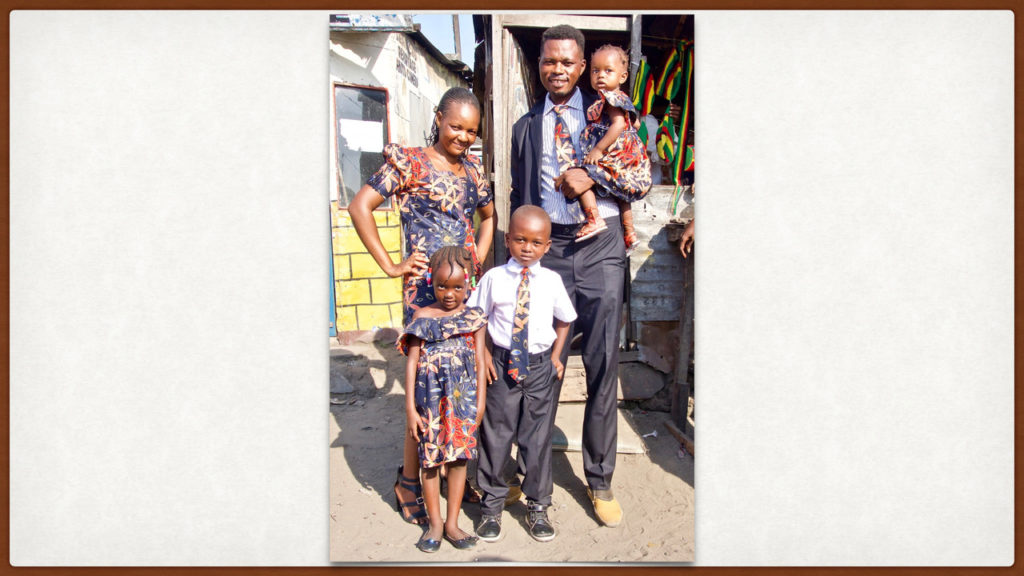
At the request of the Church History Museum, David made matching outfits for Maguy Meta Kadima, R. Nephi Kaluwa and their children Délice, Prémices, and Icon.
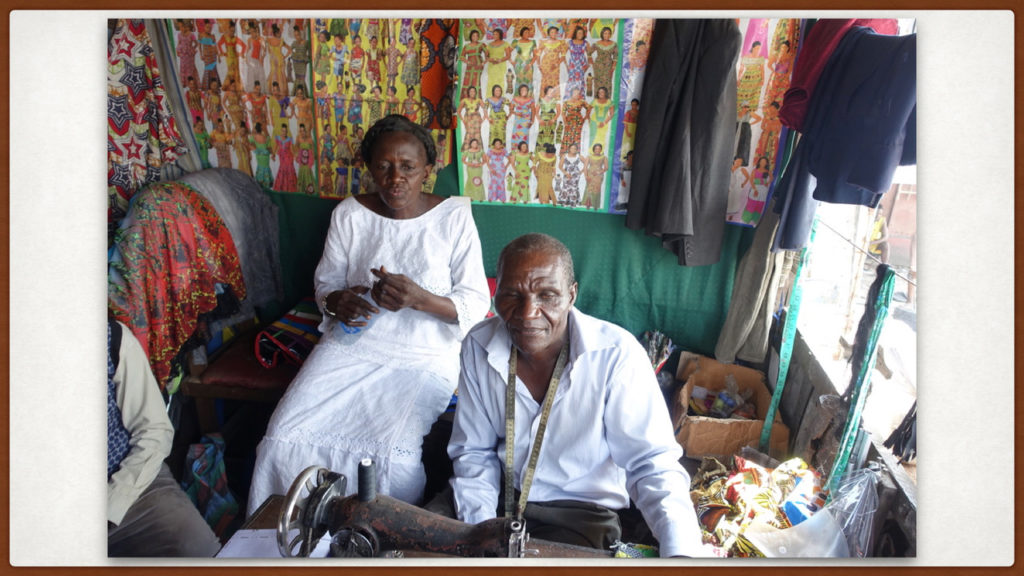
In May 2005, David had a dream in which God asked him: "Why are you still alone? Why don’t you marry?” Three days later he was sleeping, and God spoke to him again. He said: "Look at the wife I have chosen for you. She is from the same tribe. She has studied and received a degree. And she is a tailor." I woke up, and I thought, "Ah!” David began looking and eventually was led to Josephine. She was from his tribe, she had a degree, and she was a tailor. But she did not believe that he could sew. “Impossible!” she said to herself, "A blind tailor!” She came to his shop and was astonished to see him at work with some of his students. He asked if he could come to her shop to be sure she was really a tailor, too. When he arrived and met her there, he asked her to marry him and she said no. But during the visit she gave him a broken sewing machine to repair. He brought it back and she was again amazed to see that he had fixed it. After that, she started to visit him regularly. She learned that he was a committed Christian — that was something she had been looking for. They were married.
Josephine’s friends asked her, "Why did you fall in love with a blind man, you who are already handicapped yourself? How are you going to manage?” Josephine said "None of that matters. The Lord knows these things. What I can’t do myself, he can do for me. And what he can’t do for himself, I can do for him. That’s how we will support each other."
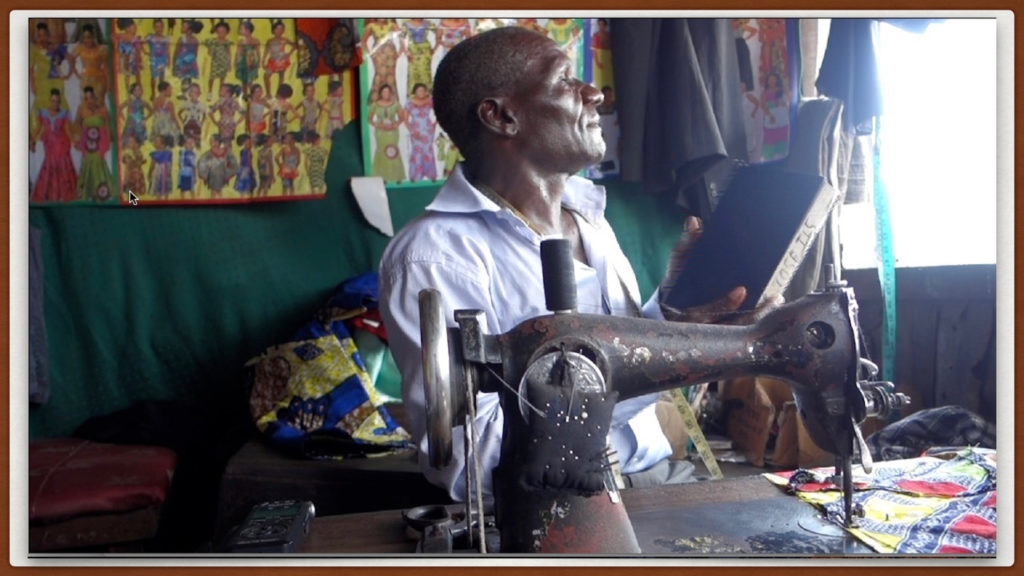
David and Josephine heard about the Church in about 2008 and began studying the Book of Mormon and other Church literature. But the only church building they knew about was far away on the other side of the city. In addition, their friends and family discouraged them, saying it was a church of witchcraft and sorcery. Relatives said if anyone died in their family, they would blame David and Josephine for it.
Eventually, they found out there was an LDS meetinghouse near them in N’Djili. They began attending and were baptized. David said he found inspiration and a testimony in the story of Joseph Smith. He was impressed by the fact that even though the Prophet had to move from place to place because of persecution, he never wearied or stopped bearing his testimony so long as he lived. Remembering Joseph Smith keeps David from getting discouraged himself. The family studies the scriptures together, sometimes lengthily when business is slow. Josephine and the children read and he listens.
Josephine’s favorite scripture is in the Gospel of John, chapter 9. When the apostles asked Jesus whether a man they saw had been born blind because of his own sin or for that of his parents, Jesus answered that both reasons were incorrect. Jesus said it had happened in order “that the works of God should be made manifest in him.” Josephine also loves the revelation of the Lord to Emma Smith in D&C 25. She says that Emma was told to be strong in prayer so that she could fortify Joseph Smith. In the same way, she said, she needed to be strong for Brother David.
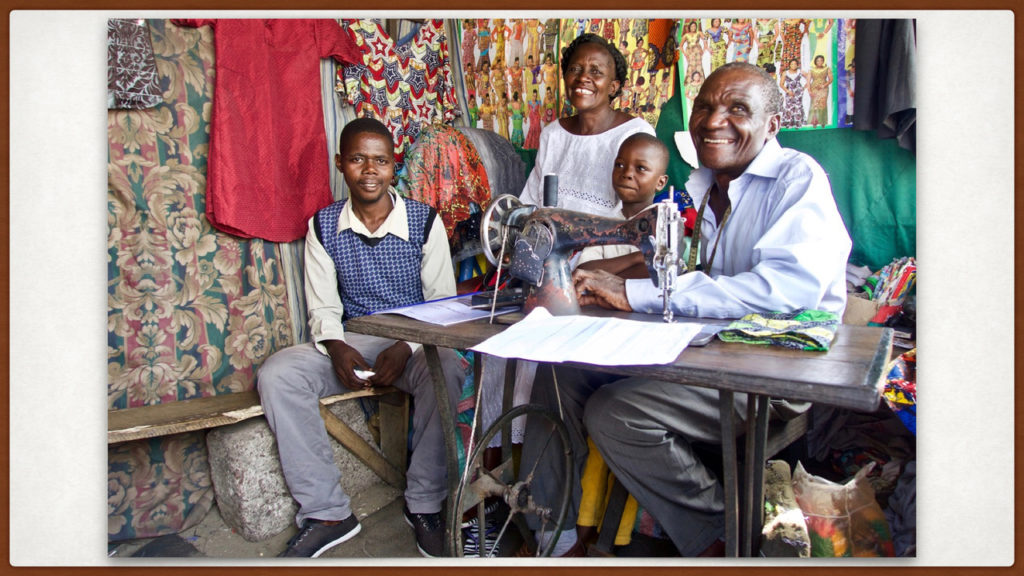
The family has a testimony of tithing. David says: "With the little that I earn with my work, we strive to pay our tithing. Even though the business isn’t working out [as well as we’d like], we are still here. And I hope things will get better one day. This is why we are in our current situation, but we have no other choice. … Even when there is no money, we get along fine and we find a way to manage.” They are looking forward to being sealed as a family after the Kinshasa Temple is dedicated.
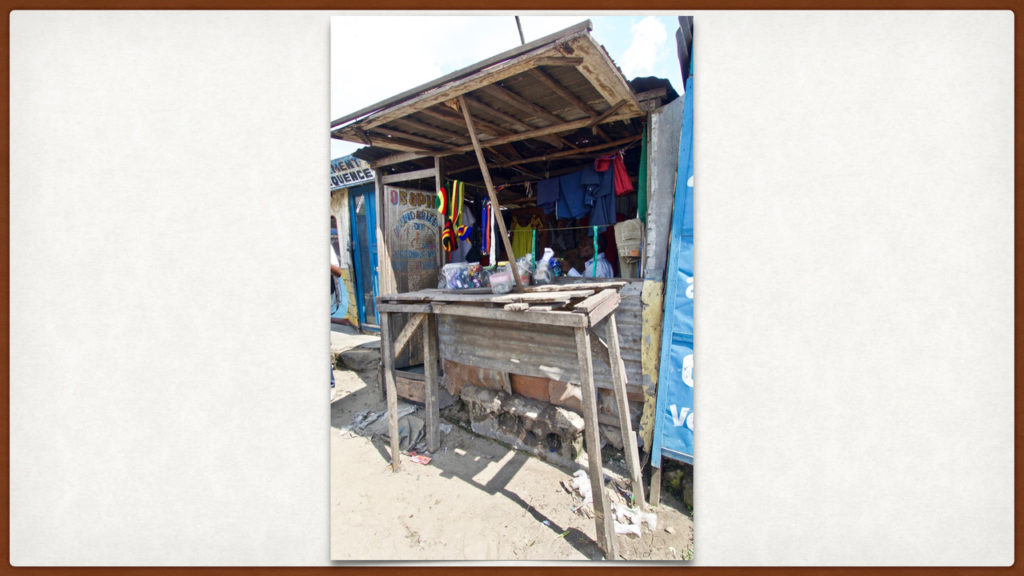
Said Josephine: "The greatest blessing of the Gospel in our life is, first of all, peace! Every day, God spares us: [we are grateful for] our home where we sleep — we don’t have any choice — even if there are some rough people around us, even if there is water all around because of the rain, our good roof keeps the rain from coming down on us. Our health is good. We don’t have any sicknesses. … We don’t have any worries. God truly watches over us with tremendous care ever since we accepted the restored Gospel."
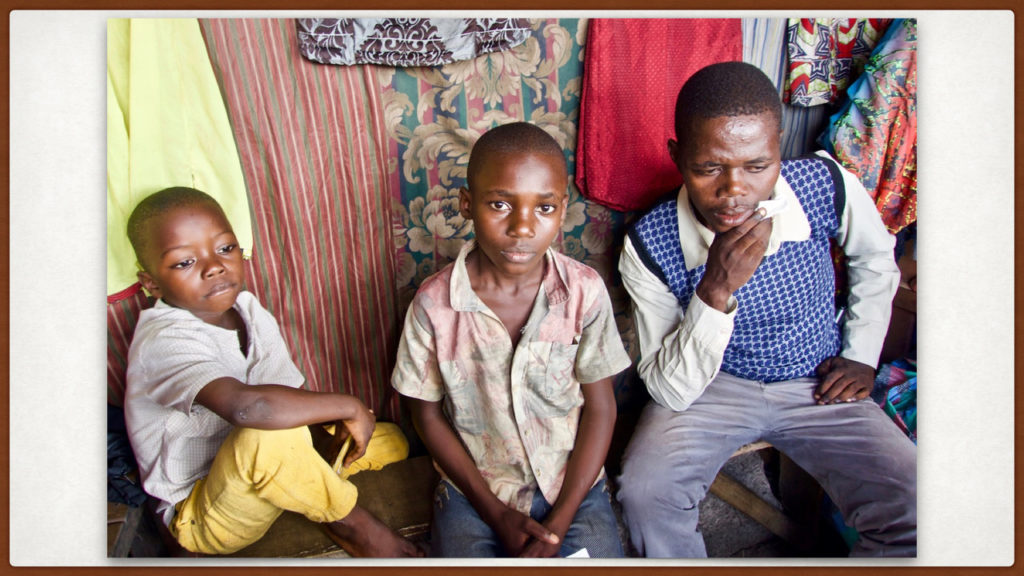
She continued: “[We’re sometimes concerned] that we don’t have much of a place to sleep. To live here with our children is not an easy thing sometimes. Living next to the highway is also dangerous. We are not really safe here. We try to save up so we can have the means to pay for transportation to go where we need to go. With great difficulty we are able to pay for the children to stay in school — we can’t always pay their fees, but we are striving to do so. These are the only concerns we have in our lives.”
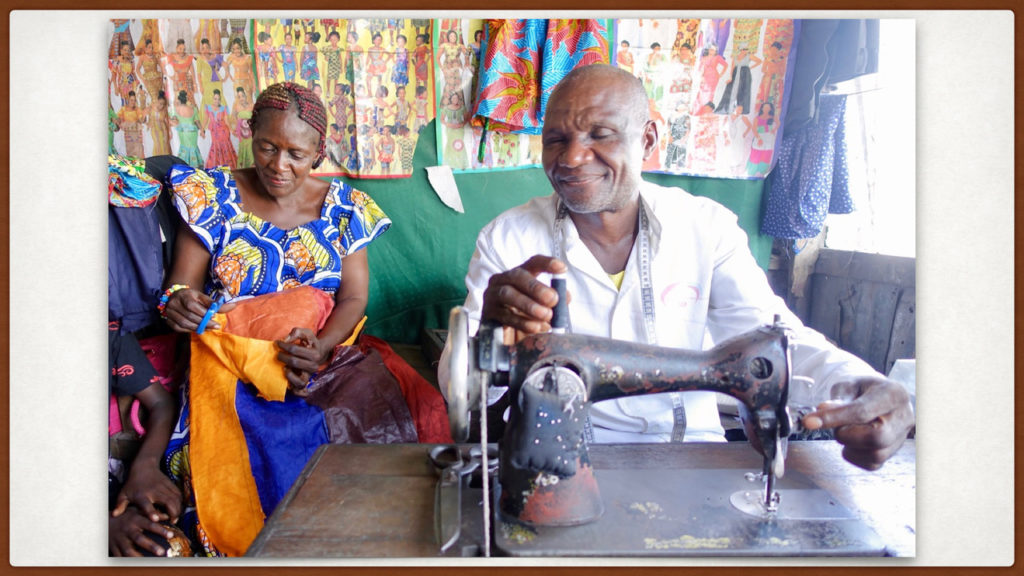
Said David: "When I was losing my sight, I continued to pray although there was no real solution. I went to see doctors, hospitals, examinations, until they finally told me that whatever they might try, I was going to be blind anyway. And I was determined from then on and I was given a grace from then on, and I thank the Lord now that I am in this Church and that I have a talent I can share with others."
Josephine added: "Our concern is that we are handicapped, but we don’t have much work. We are also concerned for others who are handicapped who don’t have any work, who can only get by through begging. [We worry about] handicapped children who are often labeled by their families as being ‘bewitched.’ Our concern is [finding a way to] do something for these children, [to find a way to] teach them skills that will allow them to work, that they can do useful things as we have been able to do. It’s also a means to share the Gospel with others. That’s why we [dream of being able to create] a Training Center to help our handicapped brothers and sisters.”
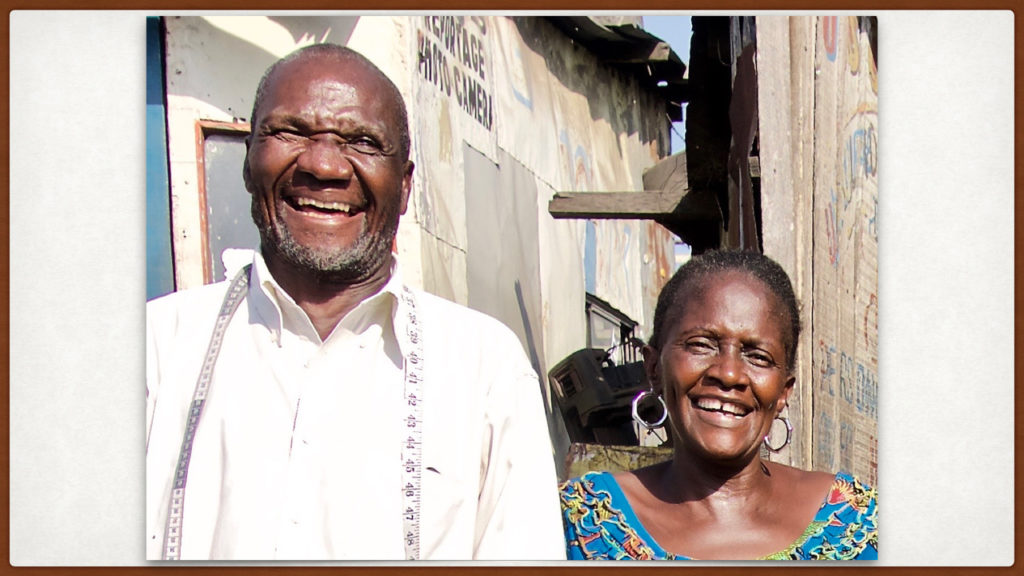
Josephine’s favorite hymn is “We gather together to ask the Lord’s blessing.” She said: "I love … the last line [of the hymn] that says He remembers us. … When it says He remembers us, that includes all of us, without exception, including the handicapped.
I know that God remembers us because He gives us the breath of life. From January until now, the month of December, we are in good health. And today, he has allowed us to be face-to-face with you."
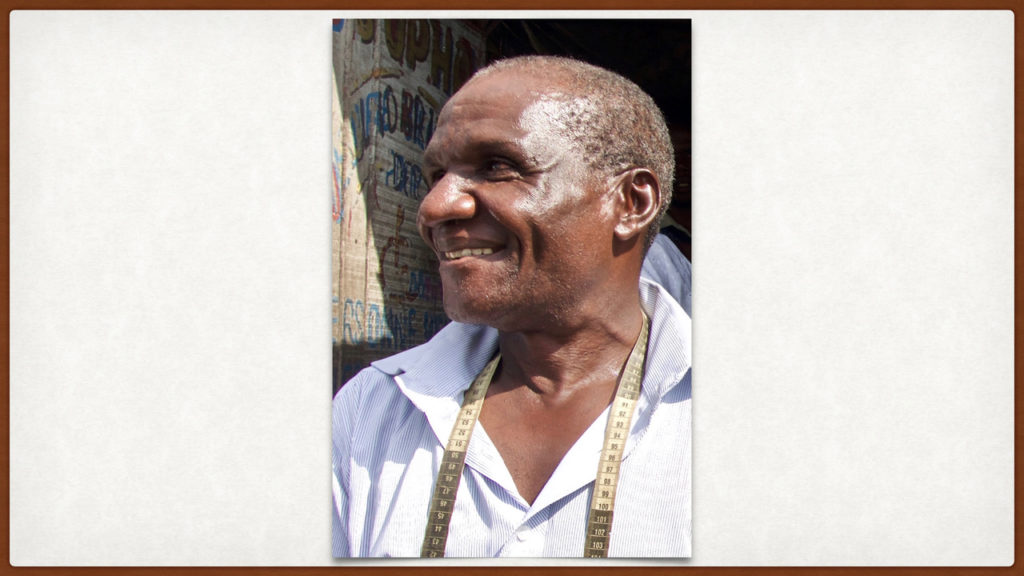
David said: “My greatest blessing is that God continues to grant me the breath of life. Many who were born when I was are already gone. But my life has been preserved. And if I’d never learned this trade, I wouldn’t have been able to share this talent. But because I was able to learn this trade and to apply my talents, God gives me my daily bread. …
I love the hymn ‘Count your blessings’ because when I hear the words … it reminds me of all that God has done for me. God has done so much for me. First, He closed my eyes so I don’t see evil. And I do not sin. And I think it’s a good thing that now I don’t see evil and I don’t sin. And I don’t have any worries or difficulties. … I count the same [blessings that you do]. I am full of joy like you.”
Some of the material in this article has been adapted from oral history interviews. My sincere appreciation to Luvualu Mwinza David, Ndotoni Josephine, and their family for sharing their inspiring stories. Thanks to Ephraim Zola for introducing us to David’s family. Thanks also to our dear friends R. Nephi Kaluwa, Maguy Meta Kadima, and their children whose positive spirits are an example to us and who helped us in so many ways during our visits. Thanks also to Matthew K. Heiss of the global support and training division at the Church History Library for his encouragement and support in the publication of this story, and for affirming permission on behalf of The Church of Jesus Christ of Latter-day Saints to use oral history-related material found in this article.
References
Bradshaw, Jeffrey M. "Faith, hope, and charity: The ‘three principal rounds’ of the ladder of heavenly ascent." In “To Seek the Law of the Lord”: Essays in Honor of John W. Welch, edited by Paul Y. Hoskisson and Daniel C. Peterson, 59-112. Orem, UT: The Interpreter Foundation, 2017.
Faulconer, James E. The Life of Holiness: Notes and Reflections on Romans 1, 5-8. Provo, UT: Neal A. Maxwell Institute for Religious Scholarship, Brigham Young University, 2012.



What a miraculous story! So full of miracles. The miracle of a blind tailor . The miracle of finding the perfect wife. The miracle of having enough work to send the children to school. The miracle of finding the Church of Jesus Christ of Latter-Day-Saints. What miracles of love.